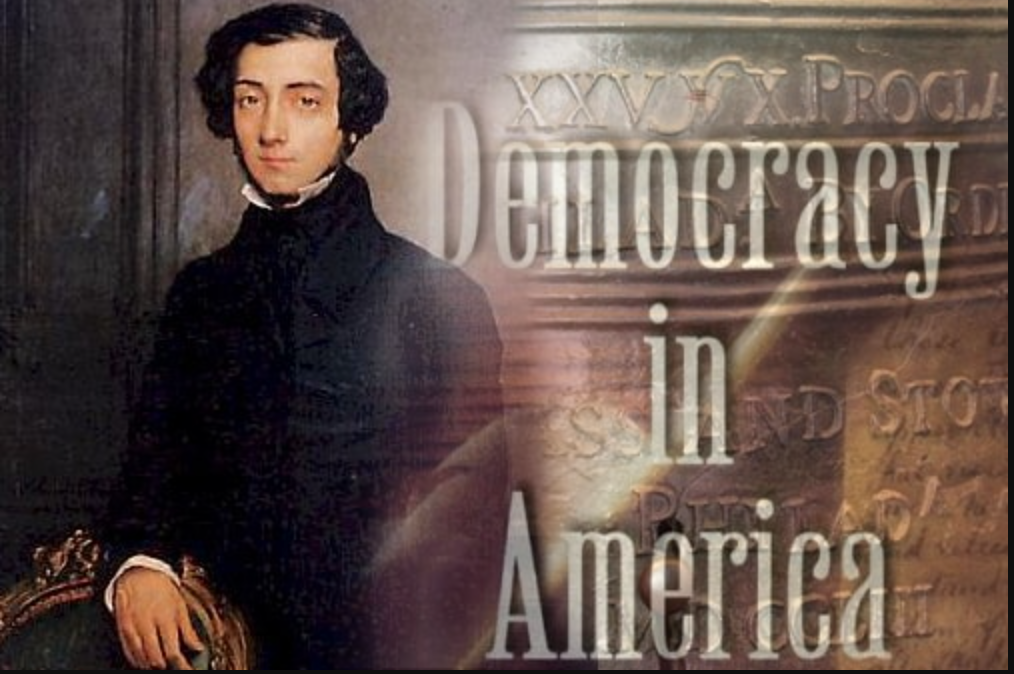"The Greatest Dangers of the American Republics Proceed from the Unlimited Power of the Majority" -- Thoughts by Alexis de Tocqueville

In this selection, Tocqueville expresses his belief that democratic-republics are liable to perish from a misuse of power rather than by impotence. He also ventured the thought that the American republics are more centralized and more energetic than the monarchies of Europe. Of interest, too, he quotes a couple of interesting passages from Hamilton and Jefferson.
August Glen-James, editor
If ever the free institutions of America are destroyed, that event may be attributed to the unlimited authority of the majority, which may at some future time urge the minorities to desperation, and oblige them to have recourse to physical force. Anarchy will then be the result, but it will have been brought about by despotism.
Governments usually fall a sacrifice to impotence or to tyranny. In the former case their power escapes from them; it is wrested from their grasp in the latter. Many observers, who have witnessed the anarchy of democratic States, have imagined that the government of those States was naturally weak and impotent. The truth is, that when once hostilities are begun between parties, the government loses its control over society. But I do not think that a democratic power is naturally without force or without resources: say, rather, that it is almost always by the abuse of its force and the misemployment of its resources that a democratic government fails. Anarchy is almost always produced by its tyranny or its mistakes, but not by its want of strength.
It is important not to confound stability with force, or the greatness of a thing with its duration. In democratic republics, the power which directs society is not stable; for it often changes hands and assumes a new direction. But whichever way it turns, its force is almost irresistible. The Governments of the American republics appear to me to be as much centralized as those of the absolute monarchies of Europe, and more energetic than they are. I do not, therefore, imagine that they will perish from weakness.
If ever the free institutions of America are destroyed, that event may be attributed to the unlimited authority of the majority, which may at some future time urge the minorities to desperation, and oblige them to have recourse to physical force. Anarchy will then be the result, but it will have been brought about by despotism.
Mr. Hamilton expresses the same opinion in the “Federalist,” No. 51. “It is of great importance in a republic not only to guard the society against the oppression of its rulers, but to guard one part of the society against the injustice of the other part. Justice is the end of government. It is the end of civil society. It ever has been, and ever will be, pursued until it be obtained, or until liberty be lost in the pursuit. In a society, under the forms of which the stronger faction can readily unite and oppress the weaker, anarchy may as truly be said to reign as in a state of nature, where the weaker individual is not secured against the violence of the stronger: and as in the latter state even the stronger individuals are prompted by the uncertainty of their condition to submit to a government which may protect the weak as well as themselves, so in the former state will the more powerful factions be gradually induced by a like motive to wish for a government which will protect all parties, the weaker as well as the more powerful. It can be little doubted that, if the State of Rhode Island was separated from the Confederacy and left to itself, the insecurity of right under the popular form of government within such narrow limits would be displayed by such reiterated oppressions of the factious majorities, that some power altogether independent of the people would soon be called for by the voice of the very factions whose misrule had proved the necessity of it.”
Jefferson has also thus expressed himself in a letter to Madison: “The executive power in our Government is not the only, perhaps not even the principal, object of my solicitude. The tyranny of the Legislature is really the danger most to be feared, and will continue to be so for many years to come. The tyranny of the executive power will come in its turn, but at a more distant period.” I am glad to cite the opinion of Jefferson upon this subject rather than that of another, because I consider him to be the most powerful advocate democracy has ever sent forth.
